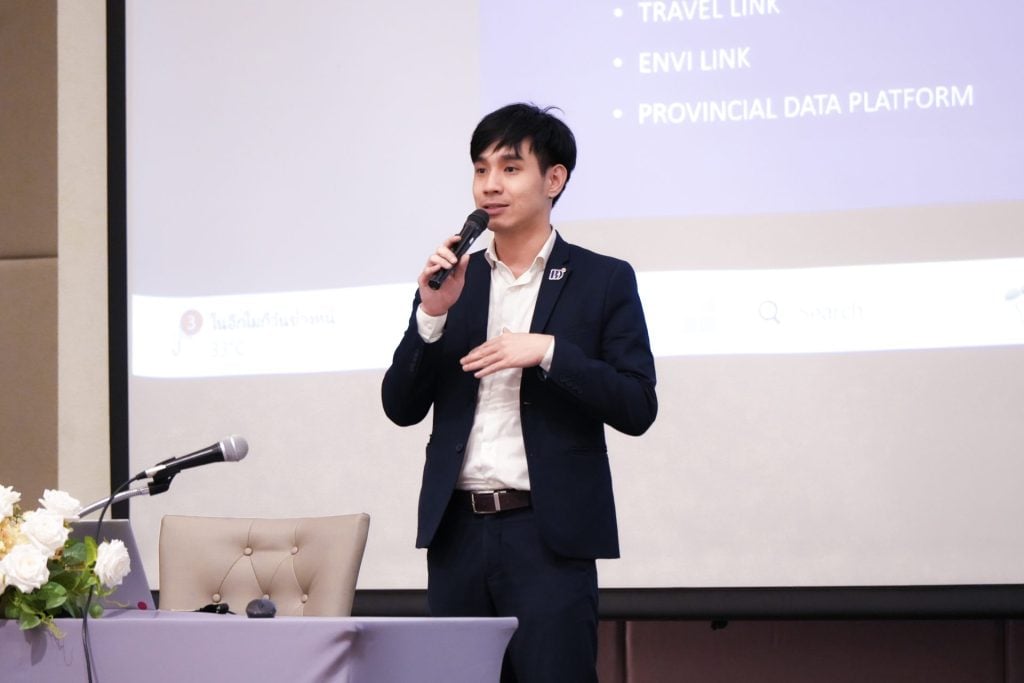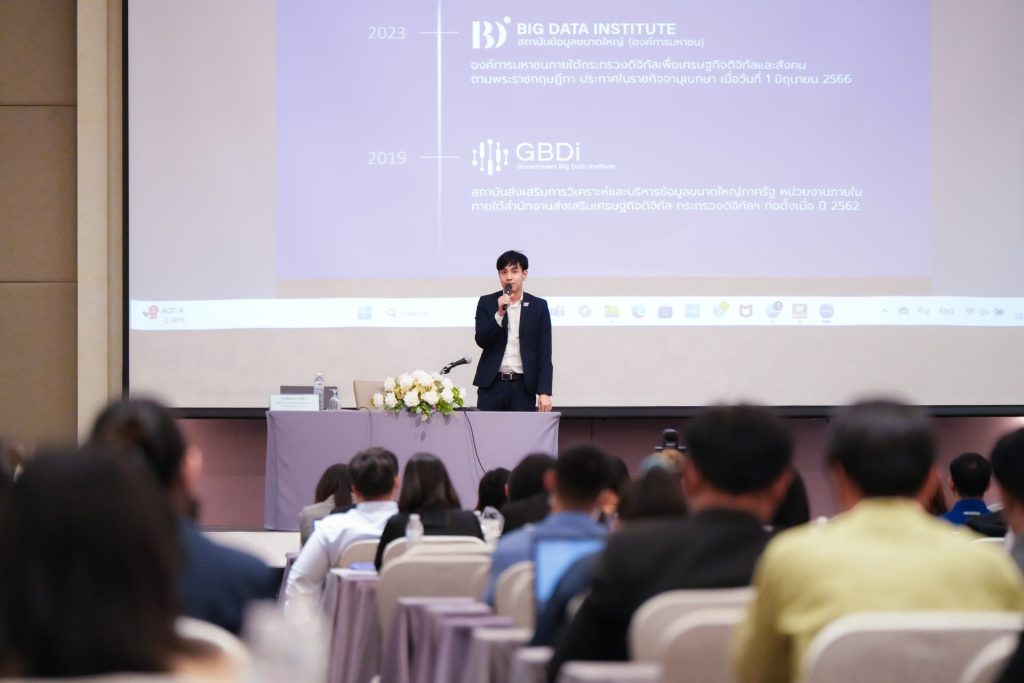18 กรกฎาคม 2568, กรุงเทพมหานคร – สถาบันข้อมูลขนาดใหญ่ (องค์การมหาชน) หรือ BDI โดย ดร.พีรดล สามะศิริ ผู้จัดการโครงการและนักวิทยาศาสตร์ข้อมูลอาวุโส ฝ่ายบริการวิเคราะห์ข้อมูล เข้าร่วมเป็นวิทยากรในหัวข้อ “Data Catalog: Accelerate Data Driven & Big Data Analytics” ภายในงานประชุมเชิงปฏิบัติการ “การส่งเสริมการใช้งานระบบ Government Data Catalog ประจำปีงบประมาณ พ.ศ. 2568” จัดโดยสำนักงานสถิติแห่งชาติ ณ โรงแรมทีเค.พาเลซ แอนด์ คอนเวนชั่น กรุงเทพมหานคร

ในการบรรยาย ดร.พีรดล ได้นำเสนอการดำเนินงานของ BDI ที่เชื่อมโยงการใช้ข้อมูลเพื่อการพัฒนาในหลากหลายมิติ อาทิ โครงการ Health Link ระบบเชื่อมโยงข้อมูลด้านสุขภาพระหว่างหน่วยบริการสาธารสุขทั่วประเทศ, โครงการ Travel Link แพลตฟอร์มข้อมูลอัจฉริยะด้านการท่องเที่ยวแห่งชาติ, โครงการ Envi Link แพลตฟอร์มข้อมูลสิ่งแวดล้อมเพื่อการพัฒนาที่ยั่งยืน และยกระดับคุณภาพชีวิตคนไทย รวมถึงแพลตฟอร์มการเชื่อมโยงและวิเคราะห์ข้อมูลขนาดใหญ่ (ดีทู) หรือ Data Integration and Intelligence Platform (D2)

แพลตฟอร์มดีทูไม่ได้มุ่งสร้างระบบข้อมูลขึ้นใหม่ แต่เน้นการบูรณาการและเชื่อมโยงข้อมูลที่มีอยู่เดิมจากหลากหลายภาคส่วน ทั้งจากหน่วยงานภาครัฐและเอกชน เพื่อให้เกิดระบบนิเวศข้อมูลที่ใช้ร่วมกันได้อย่างมีประสิทธิภาพ พร้อมให้บริการวิเคราะห์ข้อมูลโดยทีมนักวิทยาศาสตร์ข้อมูลของ BDI เพื่อสนับสนุนการตัดสินใจและวางแผนเชิงนโยบายอย่างแม่นยำ ตอบโจทย์การพัฒนาประเทศในทุกมิติ โดยมีเป้าหมายสูงสุดของดีทู คือการผลักดันประเทศไทยสู่การเป็นประเทศที่ขับเคลื่อนด้วยข้อมูล (Data-Driven Nation) ที่สามารถใช้ข้อมูลเป็นเครื่องมือเพื่อการพัฒนาเศรษฐกิจและสังคมที่ยั่งยืน

ทั้งนี้ ดีทูให้บริการผ่านกลไกสำคัญ เช่น การสร้างถนนทางเทคโนโลยีของข้อมูล (Data Linkage Engine) เพื่อรองรับการเชื่อมโยงและใช้งานร่วมกับ DII Data Catalog ระบบบัญชีข้อมูล และ และบริการวิเคราะห์ของ DII ทั้งในปัจจุบันและที่อยู่ระหว่างการพัฒนาในอนาคต เพื่อให้โครงข่ายข้อมูลพร้อมรองรับการเชื่อมต่อกับระบบของหน่วยงานต่าง ๆ นอกจากนี้ยังมี Dashboard and Analytics Tools ซึ่งเป็นเครื่องมือที่ช่วยให้หน่วยงานต่าง ๆ สามารถวิเคราะห์ข้อมูลเชิงลึกและตัดสินใจบนพื้นฐานของข้อมูลจริงที่ถูกเชื่อมโยงเข้าสู่ระบบฯ รวมถึงการใช้กระบวนการปกปิดข้อมูลส่วนบุคคล (Hashing) เพื่อแปลงข้อมูลระบุตัวบุคคลทางตรง ให้เป็นรหัสแทนค่า (Pseudonymized Data) เปรียบเหมือนการใส่รหัสแทนชื่อ ซึ่งช่วยให้ไม่สามารถระบุตัวบุคคลได้โดยตรง แต่ยังคงสามารถวิเคราะห์และค้นหา insight ที่เป็นประโยชน์จากข้อมูลได้ ทำให้การวิเคราะห์ข้อมูลเพื่อการออกแบบนโยบายและการคุ้มครองความเป็นส่วนตัวของบุคคลสามารถดำเนินการได้พร้อมกัน

เนื้อหาการบรรยายยังเน้นถึงบทบาทของระบบบัญชีข้อมูลภาครัฐ (Data Catalog) ซึ่งเป็นกลไกสำคัญในการส่งเสริมการแบ่งปันและการใช้ประโยชน์จากข้อมูลภาครัฐอย่างเป็นระบบ เพื่อสนับสนุนการตัดสินใจเชิงนโยบายที่แม่นยำ เพิ่มประสิทธิภาพการทำงาน และยกระดับการให้บริการสาธารณะของภาครัฐ พร้อมยกตัวอย่างการวิเคราะห์ข้อมูลขนาดใหญ่ (Big Data Analytics) ที่ทำให้เกิดการใช้งานข้อมูลเชิงลึก ซึ่งมีบทบาทสำคัญในการพัฒนาองค์กรดิจิทัลทั้งในด้านนโยบาย การบริการ และการบริหารจัดการ

การประชุมครั้งนี้จัดขึ้นเพื่อเสริมสร้างความรู้ ความเข้าใจเกี่ยวกับการแบ่งปันข้อมูลระหว่างหน่วยงานภาครัฐ ตามแนวทางการพัฒนาองค์กรสู่ความเป็นดิจิทัล รวมถึงการปรับปรุงประสิทธิภาพของระบบบัญชีข้อมูลภาครัฐ (Government Data Catalog: GD Catalog) ระบบบัญชีข้อมูลหน่วยงาน (Agency Data Catalog) และระบบบัญชีข้อมูลพื้นที่ (Area Data Catalog) พร้อมทั้งถ่ายทอดทิศทางการพัฒนาระบบบัญชีข้อมูลของประเทศในอนาคต โดยการประชุมได้รับความสนใจจากดผู้แทนหน่วยงานระดับกรมและเจ้าหน้าที่ที่เกี่ยวข้องเข้าร่วมกว่า 190 คน
สถาบันข้อมูลขนาดใหญ่ (องค์การมหาชน) ยังคงเดินหน้าเสริมสร้างความร่วมมือกับหน่วยงานภาครัฐในการพัฒนาโครงสร้างพื้นฐานข้อมูลที่ได้มาตรฐาน เชื่อมโยงกันอย่างมีประสิทธิภาพ และวางรากฐานสำคัญในการขับเคลื่อนประเทศไทยด้วยข้อมูล (Data-Driven Nation)
- sirirat_bdihttps://bdi.or.th/en/author/sirirat_bdi/
- sirirat_bdihttps://bdi.or.th/en/author/sirirat_bdi/
- sirirat_bdihttps://bdi.or.th/en/author/sirirat_bdi/
- sirirat_bdihttps://bdi.or.th/en/author/sirirat_bdi/













